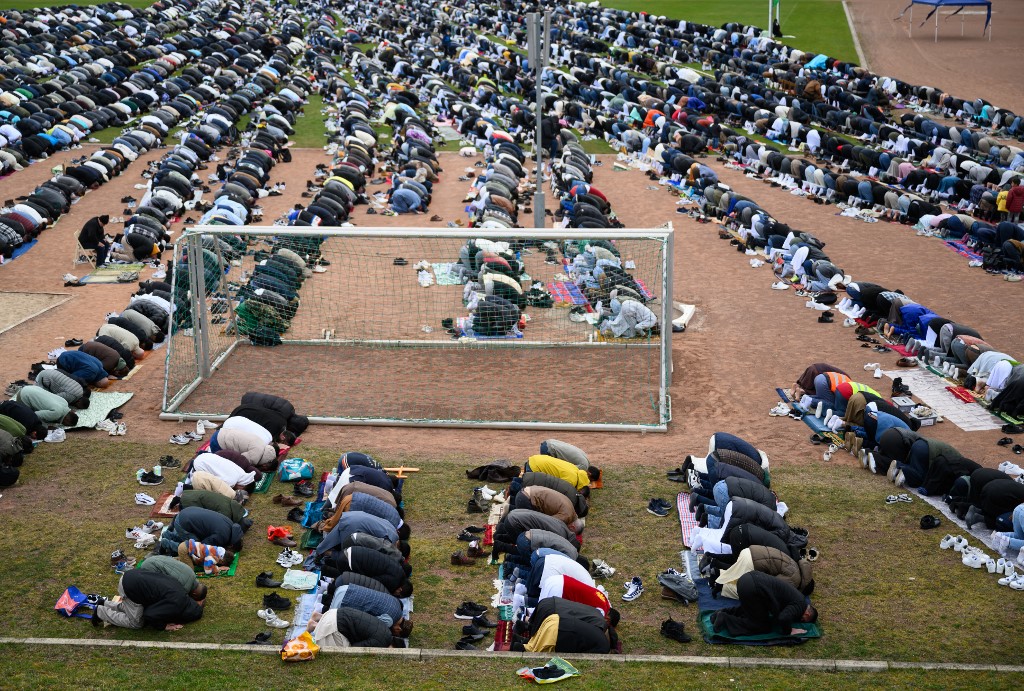
Riots and Terror Worldwide: What “Globalised Intifada” Really Means
A growing number of radical Muslims and far-left activists interpret the call to globalise the intifada as incitement to open anti-Jewish terrorism under the guise of solidarity with the people of Gaza. This, like the “Free Palestine” movement, is not only directed against Israel, but also against Jews worldwide and Western societies in general.
The Arabic word intifada literally means “uprising” or “shaking off” and first drew global attention during the riots in the then-occupied Palestinian territories between 1987 and 1993. These protests began with strikes and demonstrations but soon turned violent, targeting even those suspected of cooperating with Israel. The second intifada (2000–2005), also known as the “Al-Aqsa Intifada,” was far more brutal. Hamas, the Al-Aqsa Martyrs’ Brigades, Fatah’s Tanzim militia, Palestinian Islamic Jihad, and other terrorist organisations carried out countless attacks, resulting in the deaths of more than 1,000 Israelis.
From the very beginning, the word intifada has been associated with brutal violence carried out under the banner of “liberation from occupation”.
A „Liberation Struggle” connecting the Left and Muslims
The term colonialism has long inspired sympathy among both the political Left and Muslim communities, as it symbolises a just struggle against what they perceive as oppressive colonial powers. As early as 2002, protesters against the G8 summit in Ottawa, Canada, displayed banners reading “Globalise the Intifada.” From 2021 onwards, this slogan has been increasingly chanted in Western cities such as New York, London, and Berlin—often alongside “Free Palestine” and “From the River to the Sea”.
Groups like the New York-based, Palestinian-led Within Our Lifetime (WOL) have promoted this slogan at protests and on social media platforms as a form of opposition to Israeli policy and Western support for the country. The Palestinian Youth Movement (PYM) and Samidoun have also adopted the slogan—frequently pairing it with “From the River to the Sea”—alongside members of far-left, anti-Zionist, non-Arab movements, including the Party for Socialism and Liberation.
Linksextremisten und Islamisten haben sich verbündet, und nicht nur Israelis sind gefährdet, sondern Juden weltweit. Und ebenso Nichtjuden, wie Terroranschläge zeigen, so @shlomosapiens. Stell‘ Dir vor, wir sind im „Heiligen Krieg“, und keiner merkt’s. https://t.co/3MiCcYNZS2 pic.twitter.com/4OPwlCSyDT
— NIUS (@niusde_) June 12, 2025
Escalation of anti-Israel sentiment
Anti-Israel demonstrations escalated dramatically after 7 October 2023, when Palestinian terrorists attacked communities along the southern Israeli border. The anti-Israel movement in the West gained renewed momentum. From the US to Berlin, there were hate-mongering protests, occupation of lecture halls, acts of vandalism, graffiti, and physical attacks against Jews.
In Europe—particularly in countries with high of Muslim populations—anti-Semitic crimes increased sharply.
According to the Association of Research and Information Centres on Antisemitic Crimes (RIAS), 8,627 anti-Semitic incidents were recorded in Germany in 2024, marking a 77 per cent increase compared to 2023. These included eight cases of extreme violence, 186 physical attacks, and 300 threats. In France, anti-Semitic incidents rose by over 350 per cent compared to the previous year, with 28 per cent of them being violent.
“Intifada! Intifada! Long live the intifada!”—such chants could also be heard at Columbia University, seen as an open threat directed primarily at Jewish students. In London, crowds shouted “From London to Gaza, globalise the intifada!” In Los Angeles, a man wearing a keffiyeh and a Hamas headband chanted, “From Mexico to Gaza, globalise the intifada.”
In many places, these violent manifestations of political struggle go back decades. One example is the International Criminal Court in The Hague issuing an arrest warrant for Israeli Prime Minister Benjamin Netanyahu, nius.de reports.
Anti-Semitism taking new forms
“Globalise the Intifada” has evolved into a globalised hate campaign. The rebranding of terrorism as justice, and of antisemitism as resistance, has now entered mainstream media and politics. The resurgence of antisemitism in recent years has taken on new forms, often cloaked in the language of social justice and political activism. Behind slogans like “Globalise the Intifada” and “Free Palestine” lies an Islamist ideology that equates to jihad against “infidels”.
Germany’s Muslim community trending towards radicalisation
The Welt reported on a study conducted by the Centre for Islamic Theology and Politics at the University of Münster, led by Islamic theologian Mouhanad Khorchide.
According to the study, one in five Muslims living in Germany with an immigrant background is in an emotional state that predisposes them to radicalisation.
Was ist #Islamismus und wie lässt sich religiös begründeter Radikalisierung vorbeugen? Diese Fragen besprechen Sabine Damir-Geilsdorf, Mouhanad Khorchide und Philip Mohamed Al-Khazan in der neuen Folge vom APuZ-Podcast, moderiert von @sarahzerback: https://t.co/yqXa2VsEFD pic.twitter.com/IOvQs66h6v
— APuZ (@APuZ_bpb) June 6, 2025
A majority of those surveyed responded affirmatively to questions such as whether Islam should be the only religion, or whether Sharia law is superior to German law. A third of respondents supported violence in retaliation for perceived injustices, while one in ten said they would personally resort to violence to advance Muslim interests. Given that around 5.6 million Muslims live in Germany—possibly more—that would amount to roughly 100,000 individuals, the report notes. According to Germany’s domestic intelligence agency, approximately 28,280 people in the country belong to Islamist circles, including 9,540 individuals prone to violence.

